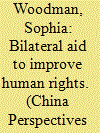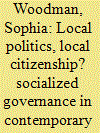|
|
|
Sort Order |
|
|
|
Items / Page
|
|
|
|
|
|
|
| Srl | Item |
| 1 |
ID:
050916


|
|
|
| 2 |
ID:
184071


|
|
|
|
|
| Summary/Abstract |
Drawing on immersive ethnographic fieldwork at three events in Scotland, all grounded in ecological sensibilities and focusing respectively on alternative medicine, music and reviving seasonal celebrations, this article illuminates aspects of what we call ‘festive commoning’. We ask: how, and to what extent, were commons ‘against and beyond’ capital produced in these gatherings? We re-read a history of resistance to festive autonomy in this light, as a continuing struggle against capitalist enclosures of time, space, knowledge, history and being in the world. We argue that alternative grassroots gatherings can produce a ‘festive commons’ that resists such enclosures, including breaking down divisions between self and other, human and non-human beings. Such processes generate collective joy, and enliven the radical imagination. Experiencing festive commons is not only an aspect of the pleasure valued in some radical traditions, but also makes another world possible, even if only a temporary one.
|
|
|
|
|
|
|
|
|
|
|
|
|
|
|
|
| 3 |
ID:
184064


|
|
|
|
|
| Summary/Abstract |
For our special issue, ‘Radical Democratic Citizenship: From Practice to Theory’, we examine different forms of radical theorising and politics at the grassroots. Radical democratic citizenship entails forms of struggle against gross social, economic and political miseries and injustices. This special issue explores the implications of a renewed wave of revolutionary grassroots action. ‘Radical’ indicates firstly the potential for sustained fundamental change of the economic and political landscape that, secondly, is pursued from the grassroots, and, thirdly, through an egalitarian, democratic process that are transformative in rethinking and reshaping the parameters of what democracy can and should be. We raise the question of how localised alternatives -– which have been the most fertile terrain for such generation of different worlds – might be able to address wider questions of global inequality on our finite planet.
|
|
|
|
|
|
|
|
|
|
|
|
|
|
|
|
| 4 |
ID:
105060


|
|
|
|
|
| Publication |
2011.
|
| Summary/Abstract |
The channeling of popular struggles through legal cases is central to the strategy of the emerging "rights defense" movement in China, linking grassroots contention with professional mediators who translate grievances into the institutional environment of law. This was the case in an unusual, ultimately unsuccessful campaign in 2005 to remove an elected village chief in Taishi Village in Guangdong, China, by legal means. While the grievances that sparked the campaign were about the unequal distribution of the benefits from village development, the strategy of instituting a recall procedure and the framing of the campaign in terms of democracy and rule of law obscured distinctly gendered issues of poverty and inequality in the village, even though women were among the most visible protesters. This article employs a "sociology of translation" to link framing processes and power dynamics, thus proposing a methodological approach to reconnecting framing with other aspects of movements. In the Taishi case, the translation of the dispute into the language of law had contrary effects: it opened the door to a legitimate, if temporary, public space for the airing of villagers' claims. At the same time, translation legitimized the voices of "experts" who then became de facto leaders in this public space; it also increasingly shifted the action to the internet, to which the villagers apparently had no access. This analysis raises questions about whether such strategies may result in either the formation of durable rights-based identities among grassroots participants or a sense of being connected to a broader social movement.
|
|
|
|
|
|
|
|
|
|
|
|
|
|
|
|
| 5 |
ID:
146512


|
|
|
|
|
| Summary/Abstract |
The demise of collective units that attach citizens to the state in China has been overstated; the hegemonic form of Chinese citizenship today links participation and welfare entitlement to membership in a collective unit in a specific locality. This article presents an ethnographic account of the operation of this “normal” form of local citizenship in resident and villager committees in Tianjin. These committees combine participatory and welfare dimensions of citizenship in one institutional setting. Here, citizens are bound to the state through a face-to-face politics that acts both as a mechanism of control and a channel for claims-making, a mode of rule I term “socialized governance,” which blurs the boundaries between political compliance and social conformity, and makes social norms a strong force in the citizenship order. While variably achieved in practice, this form of citizenship represents an ideal that shapes conditions for politics and perceptions of inequality.
|
|
|
|
|
|
|
|
|
|
|
|
|
|
|
|
| 6 |
ID:
088720


|
|
|
|
|
| Publication |
2009.
|
| Summary/Abstract |
The most important power granted to autonomous areas in China's system of Nationalities Regional Autonomy should allow them to modify higher-level laws and policies through autonomy legislation. This is one of the two principal methods for the exercise of autonomy, with the other being the holding of key government posts by minority members. Yet efforts by the five autonomous regions to exercise their powers to enact autonomy legislation have been repeatedly blocked. The granting of autonomy powers in the PRC has been half-hearted, and few powers commonly associated with autonomy systems are available to autonomous areas. Even so, in China as elsewhere, giving autonomy legal expression, however vague, has made the law a field for contention over its proper meaning and scope.
Based primarily on Chinese documentary sources, this article focuses on contestation over the meaning of autonomy in the terrain of law. In their explorations of the modification power and the relative status of autonomy legislation, legal scholars and minority activists articulate a vision of autonomy under a future constitutionally governed state. Such an "extensive" autonomy, defined by its historical roots to allow for different "systems," could potentially provide some space for real self-government. In contrast, some powerful central government institutions block development of this field of law, implicitly supporting the view that autonomy is history and economic development holds the key to the future. Even given the necessary political will, in the absence of the key components of autonomy systems, divisions within the Chinese state could create barriers to the realization of "genuine autonomy."
|
|
|
|
|
|
|
|
|
|
|
|
|
|
|
|
|
|
|
|
|